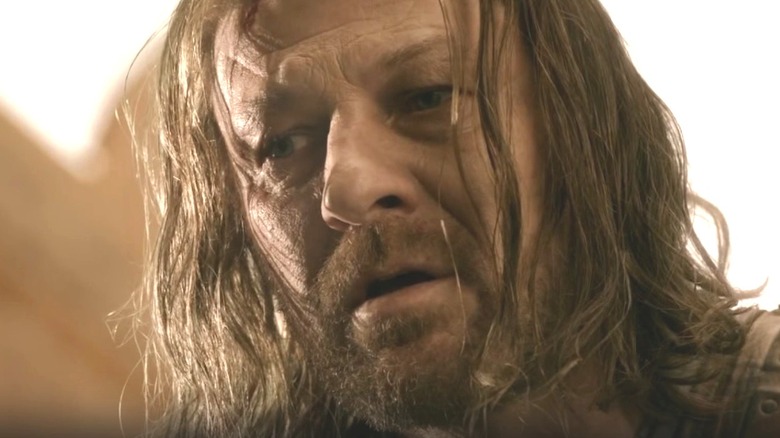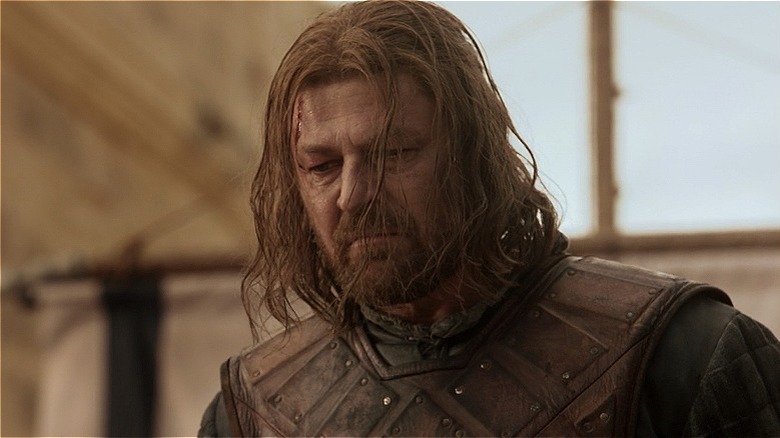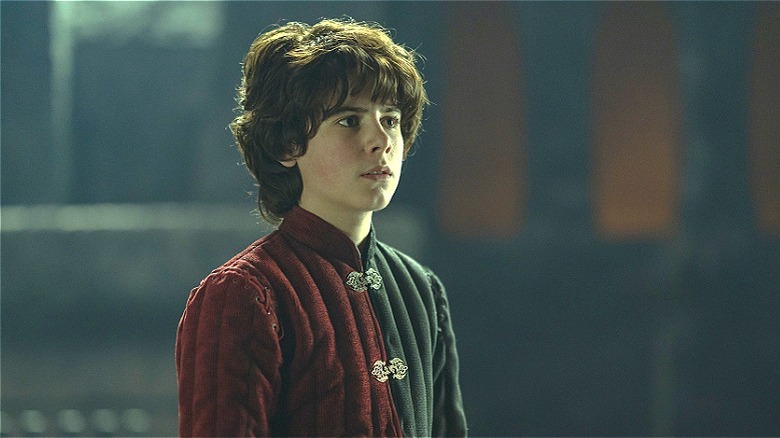Game Of Thrones' Sean Bean Didn't Give His Co-Stars Any Advice On Dying
If there is anyone who knows how to give a good death onscreen, it's Sean Bean. It is such a well-known fact in the entertainment industry that at this point Bean's appearance in anything is almost a guarantee that his characters are not long for this world. Boromir's end in "The Fellowship of the Ring" is just one example of this, one of the most heroic and significant displays of character development in the series. But when it comes to heartbreaking deaths, no one is likely to forget the now iconic execution of Ned Stark.
In the highly regarded first season of "Game of Thrones," Ned's trademark honor ultimately leads to his downfall. Instead of secretly enacting a coup against the Lannisters as any sane person would have done, Ned outright tells Cersei (Lena Headey) that he is contesting her son's right to the throne. This signs his death warrant, and it isn't long before he loses his head. Tragic as it may be, it also set a precedent for the future of many "Game of Thrones" characters. After that one swing of a sword, no one was safe. And when actors inevitably found that their characters' time had come, it was just a reminder of the master who had done it so many times before.
Sean Bean is not a fan of the death scene
Ned is the first Stark to go the way of the sword, but he certainly isn't the last. Not long after the Winterfell patriarch is falsely accused of treason and executed on the orders of one of the most evil characters in "Game of Thrones," many of his family members follow suit. Hopefully, Robb (Richard Madden) and Catelyn Stark (Michelle Fairley) are reunited with Ned in the light of The Seven after their infamous Red Wedding deaths, but Sean Bean let them get there on their own. In a conversation with Vulture, Bean emphasized how he didn't overstep his boundaries by telling fellow castmates how to die.
"I think everyone likes to do it their own way, you know?" Bean explained. He went on to conclude: "Dying is a very personal thing. You have to learn how to emulate that for yourself. It's quite a weird thing. It's just something you've got to do. I don't particularly enjoy it." The experienced actor has undoubtedly died more times than anyone has a right to, but his death in "Game of Thrones" was quite different from the rest of the Starks. In a public execution, Ned's demise kickstarts a war between the Starks and Lannisters that seemingly has no end. The destruction of Robb's forces is a betrayal that violates the law of hospitality, a law that is played fast and loose in related "Game of Thrones" properties.
Lucerys' death has big implications in House of the Dragon
"House of the Dragon" may take place centuries before the War of the Five Kings, but the "Game of Thrones" characters obviously learned nothing from their history. Just like Ned's death started a civil war in the Seven Kingdoms, so will the death of Prince Lucerys Targaryen (Elliot Grihault). "House of the Dragon" Season 1 ends with the aftermath of Luke's untimely death. After gauging support for his mother's claim to the throne, Luke finds that his hot-headed uncle Aemond (Ewan Mitchell) has already arrived at Storm's End on the back of his gargantuan dragon Vhagar. With the Baratheons pledged to the Greens, Luke dashes for freedom. But Aemond's desire for an eye-for-an-eye affects the actions of Vhagar. The dragon decimates Luke with a single chomp, whether that was Aemond's intention or not. Luke's death is the final straw for Rhaenyra (Emma D'Arcy), and Season 2 promises to be more bloody and unforgiving.
"I'm really interested in picking up with all of those characters that we spent all of this time introducing, particularly Rhaenyra and Alicent's families, and seeing what happens now that we've flipped the chessboard over and spilled the pieces on the ground," showrunner Ryan Condal told Entertainment Weekly. "How do all those react? That's the story that we tell in season 2 and beyond." The pieces are not only on the ground but have been ravaged by dragons with no chance of returning.


